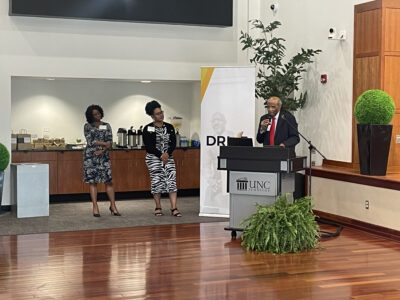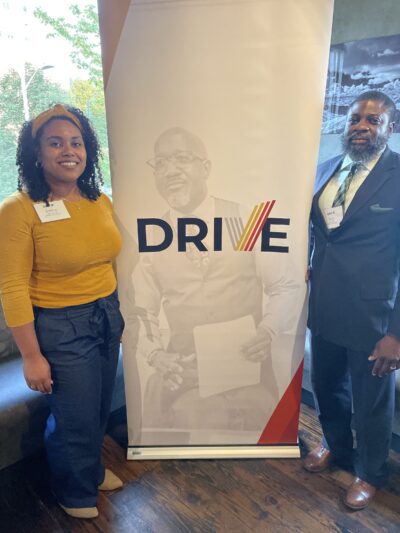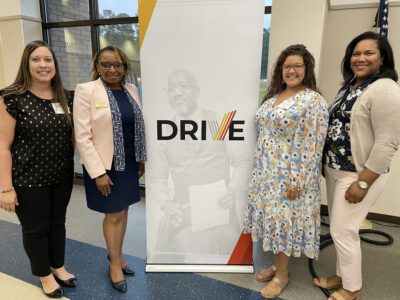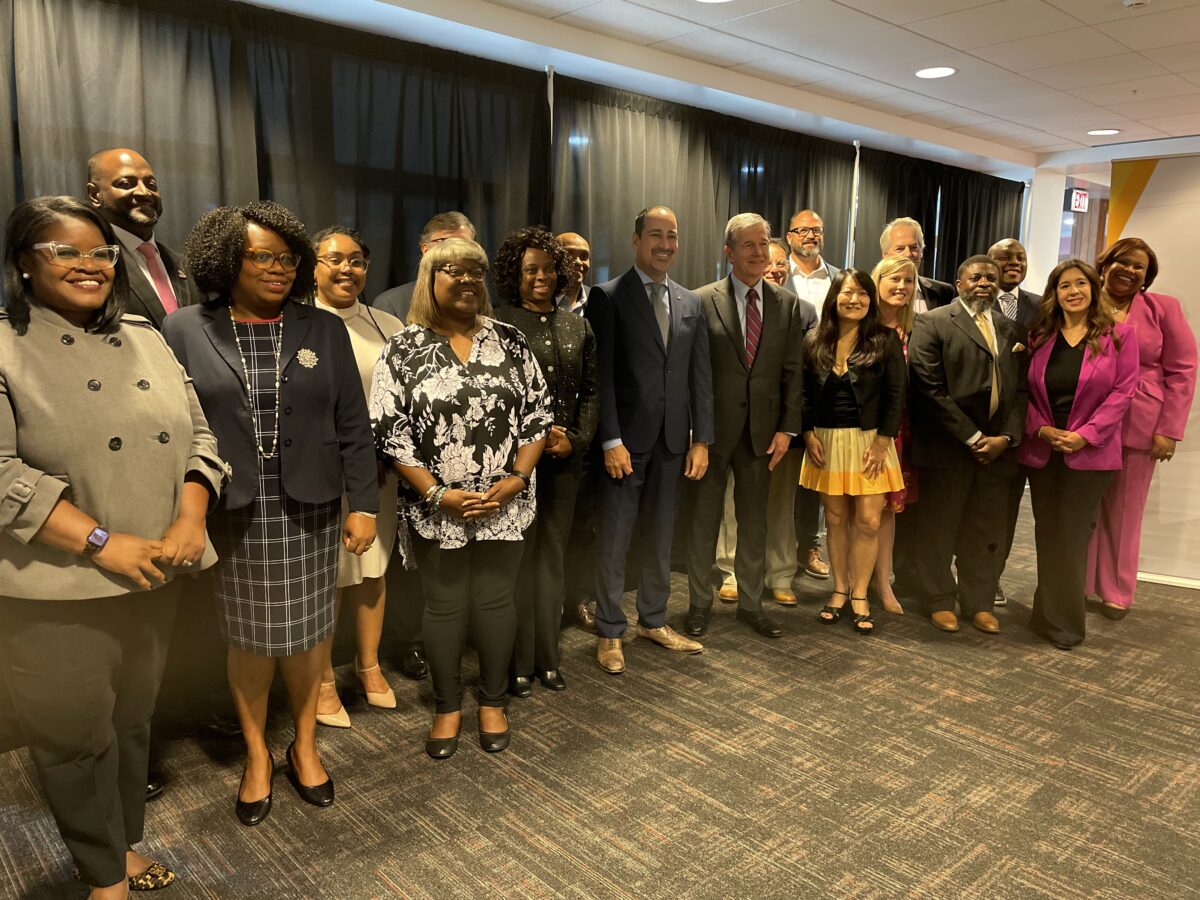
|
|
On Nov. 16 and 17, Gov. Roy Cooper’s DRIVE Task Force held their fourth and final tour stop at Winston-Salem State University (WSSU). The meeting highlighted programs and practices in the region intended to recruit and retain educators of color. Following the meeting, WSSU’s Interim Chancellor and DRIVE Task Force Chair Dr. Anthony Graham announced the inaugural State of Teacher Diversity in North Carolina luncheon.
History of the DRIVE Task Force
In Dec. 2019, Gov. Cooper issued Executive Order No. 113, which established the DRIVE Task Force. DRIVE stands for Develop a Representative and Inclusive Vision for Education. The task force consists of parents and guardians, K-12 educators, state and local government personnel, and both UNC System and community college personnel. Together, they developed recommendations for how to increase the racial, ethnic, and linguistic diversity of the state’s educator workforce.
The task force was extended to 2023, allowing for a statewide tour to learn about individuals, programs, and practices that focus on educator preparation, recruitment, and retention. The following are highlights from the final stop in Winston-Salem.
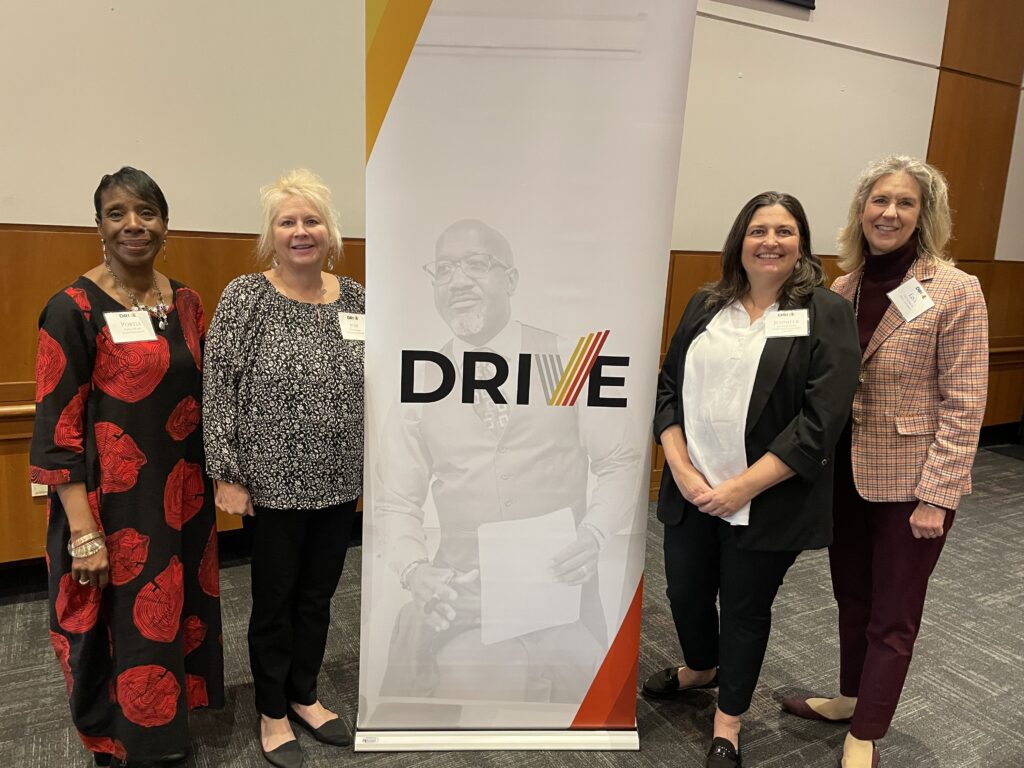
Alamance Scholars
The Alamance Scholars Program is a “grow our own” partnership between Elon University, Alamance Community College (ACC), and Alamance-Burlington School System (ABSS). The program’s mission is stated to “create a sustainable and diverse teacher pipeline for Alamance County public schools with the goal of retaining local citizens as educators in our community.”
“We realize that it takes work, it takes commitment, it takes all working together as a partnership, and we want to streamline communication between the three institutions so that we can make sure that these students are supported when they come to us,” said Portia Wade, Lecturer in Education and Director of the Alamance Scholars Program.
The program allows for ABSS students interested in becoming teachers to attend Alamance Community College, transfer to Elon University after two years, and then graduate with a bachelor’s degree. Following that, students are guaranteed a job in ABSS. Participants receive differentiated tuition at Elon in addition to being eligible for other scholarships to reduce their debt.
Jodi Hofberg, teacher scholars program coordinator at ABSS, shared several strategies for recruitment, including the Teacher Cadet I and II courses provided by the North Carolina Foundation for Public School Children, marketing during lunch periods, offering evening presentations, and accepting referrals and recommendations from parents, teachers, and school counselors.
Additionally, Hofberg stated that a vital part of the program’s success was the implementation of a dedicated high school counselor who works with their district’s specialty programs. This role collaborates with students’ home school counselors to schedule high school transcript audits and to co-advise with the community college Career and College Promise (dual enrollment) advisor.
Marathon Teaching Institute
Dr. Audrey W. Beard, dean of North Carolina Central University’s (NCCU) School of Education, stated that when thinking about African American males in the public school system, “It’s a system where they may be in a building alone; they may be the only male in the building.” With this in mind, NCCU implemented the Marathon Teaching Institute (MTI) with a mission to “recruit, retain and prepare male students of color for excellence in the field of education.”
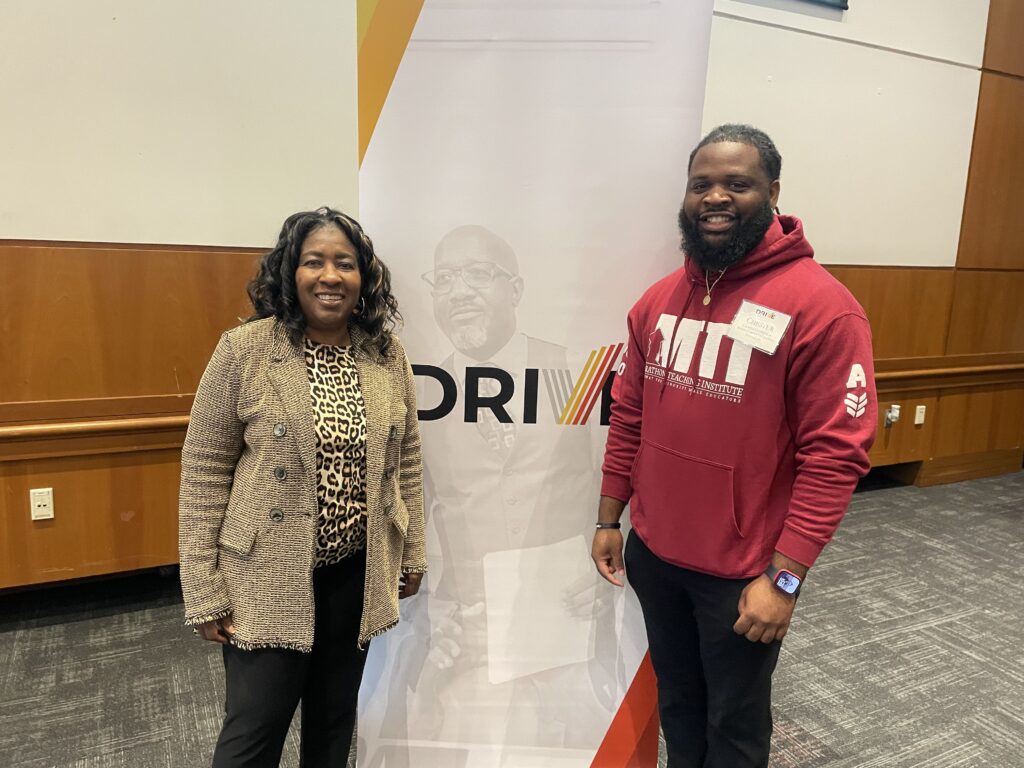
Chester Crowder Jr., a 2023 graduate of elementary education at NCCU, shared his experience in the program. He provided insight on the year-round professional development that participants engage in and the additional academic support he was provided. He also highlighted the financial support that MTI provides, such as assistance with covering fees for examinations and other scholarship opportunities.
As a result of philanthropic contributions, Dr. Beard shared that once students are admitted to the education program, their junior and senior year are typically paid for and they receive a stipend during their student teaching.
Crowder emphasized the importance of brotherhood fostered within the community.
“We have each other,” he said. “There’s 15 of us now, so we can call each other if there’s a problem. … Somebody may have an answer for you, one of your brothers.”
Winston-Salem State University
Dr. Kimberly Pemberton is an associate professor and chair of WSSU’s department of education. She proudly acknowledged the school’s historic contribution to education, highlighting that WSSU, formerly known as Winston-Salem Teachers College, was the first Black institution in the nation to grant degrees for teaching the elementary grades.
This was followed by sharing the department’s “3P Pie” conceptual framework: “Making sure that our candidates are prepared professionally … in their planning, their instruction, and their evaluation.” Dr. Pemberton emphasized that they make sure teaching candidates have their content knowledge with a social justice advocacy lens.
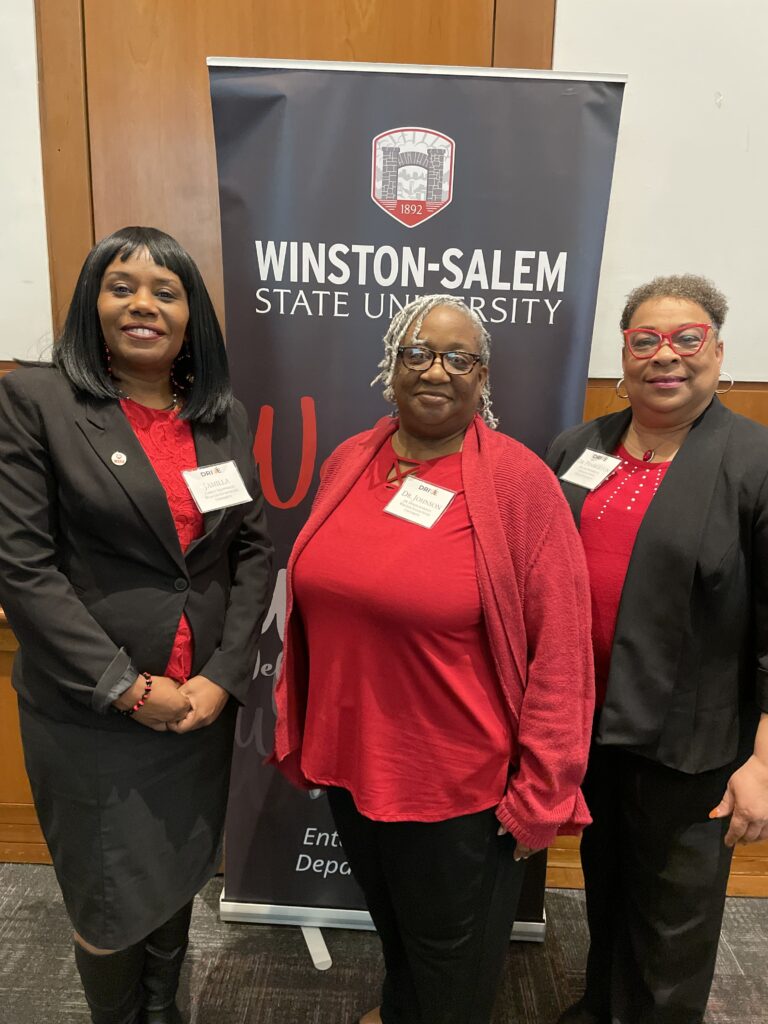
WSSU’s education opportunities have expanded over the past two years. In 2021, specifically to bring in more candidates, the university introduced three new concentrations to their Master of Arts in Teaching program: birth to kindergarten, elementary education, and health and physical education.
WSSU’s Education Preparation Program (EPP) Licensure Officer, Jamilla Shepperson, shared more about the institution’s EPP pathways.
“Gone are the days where there’s one way in and one way out. Now we need multiple points of entry, you need multiple avenues of support,” Shepperson stated.
The RAM Residency pathway through the Master of Arts in Teaching Program is one avenue to pursue for those seeking to obtain licensure. The following are two other pathways shared:
- R.A.M.S.E.S: Residency and Apprentice Model: Supporting Equity in Schools was created to provide two alternative pathways for preparing special education teachers. The initiative was established by an $1.7 million award from the Office of Special Education Programs to WSSU’s department of education. One pathway provides support throughout an 18-month Master of Arts in Teaching (MAT) program for qualified teachers with a North Carolina residency license. The second pathway is a four-plus-one model, allowing undergraduates to complete their degree with an additional year for an apprenticeship while completing their MAT coursework.
- Winston-Salem TEACH Partnership: Winston-Salem TEACH is a collaboration between Salem College, Wake Forest University, and Winston-Salem State University. The goal is to prepare recent college graduates and other professionals to transition into teaching in Winston-Salem/Forsyth County Schools. According to their website, participants receive a $30,000 stipend while completing 14 months of coursework at one of the partnered institutions and two clinical teaching internships.
Somos DPS Latinx
Dr. Jose Cardoza is an assistant principal at C.E. Jordan High School. With the support of Durham Public Schools (DPS) Superintendent Dr. Pascal Mubenga, in 2018, Sonia Marquez and Dr. Cardoza founded Somos DPS Latinx.
Dr. Cardoza shared that Latinos make up about 34.1% of the DPS student population, which drives the push for greater Latinx representation in staff. He shared that since 2018, the district has increased from 2.5% Latino staff to about 3.9% in 2022, with a goal to further increase to at least 5% by 2028. The group aims to support DPS efforts to increase and retain Latinx staff by creating a safe space where members can meet, network, and grow as professionals.
The group’s focus is to embrace the Latinx identity and culture to celebrate, inspire, educate, and support diversity throughout DPS, engage families, challenge stereotypes, and promote inclusivity for Latinx identity and culture. Hosting bilingual monthly meetings and quarterly socials and celebrations are ways in which they help build community. Additionally, Dr. Cardoza shared that a significant focus is supporting relocation, aiding in their transition to the area.
Dr. Cardoza shared his hopes of continuing to expand the reach of the program through recruitment partnerships with local businesses and other programs like Diverse and Resilient Educators Advised through Mentorship (DREAM) at UNC Chapel Hill.
State of teacher diversity in North Carolina
As previously mentioned, Winston-Salem was the final stop of the tour, indicating the conclusion of the DRIVE Task Force. However, the work of the task force continues in several ways.
In late October, following recommendations from the succession committee, a unanimous vote determined that Dudley Flood Center for Educational Equity and Opportunity will be the governing body of the task force’s work moving forward. Additionally, at the Nov. 17th meeting, Dr. Graham announced that Winston-Salem/Forsyth County would be working to develop their own version of a local task force.
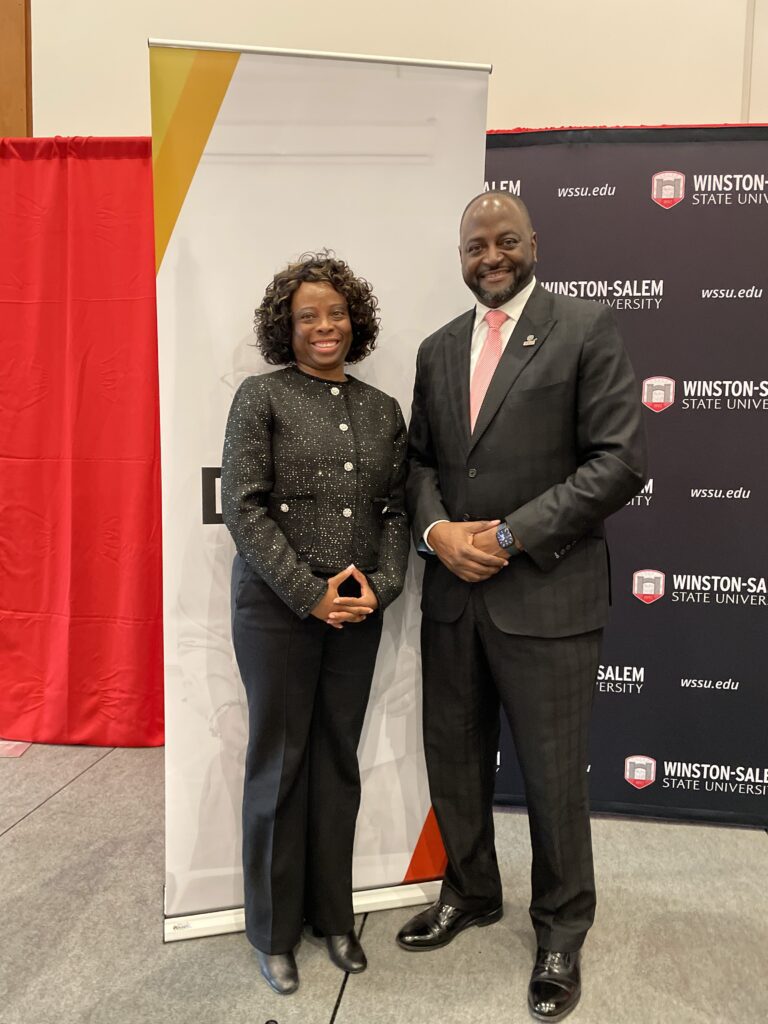
To conclude the final tour stop, a state of teacher diversity in N.C. luncheon was held, which allowed for a recap of the task force’s progression, in addition to closing remarks from 2023 Burroughs Wellcome Fund N.C. Teacher of the Year Kimberly Jones, Gov. Roy Cooper, and U.S. Department of Education assistant secretary for planning, evaluation and policy development Hon. Roberto Rodriguez. Dr. Graham hopes that the teacher diversity in N.C. luncheon will be held annually moving forward.



